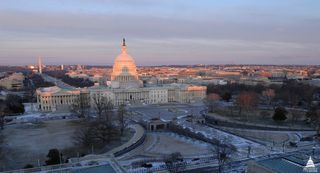House Gets C-Band Earful

The C-Band drew a lot of attention Tuesday (July 16) at a House Communications Subcommittee hearing on spectrum policy.
The FCC is currently considering how to free up some or all of the midband satellite spectrum (3.7/4.2 GHz) for 5G, spectrum that is currently used for satellite delivery of programming to broadcasters and cable operators.
Among the witnesses was Peter Pitsch, head of advocacy and government relations for the C-Band alliance, which represents the international satellite operators who deliver that video programming and hold the licenses to that spectrum.
Pitsch was making a pitch for the alliance's marketplace approach to freeing up the spectrum--rather than an FCC auction--saying it was the fastest, best way to free up the spectrum for 5G. He suggested that the country could fall behind in 5G if it did not take the fastest, best route to C-band repurposing given that midband spectrum was the sweet spot for next-gen wireless.
"Under the CBA plan, 200 megahertz would be cleared by increasing existing transmission capacity through the procurement and launch of new satellites," he said. "Every existing customer will be kept whole: they will continue to distribute their programming and not incur the costs of the transition. Thus, the CBA plan protects every service that is currently provided over C-band in the United States."
The CBA members would compensate incumbents for moving expenses, and pointed out that, while it is a marketplace auction, the FCC would oversee it, and it was being designed by a company that had worked with the FCC on its auctions for two decades.
Also weighing in at the hearing was the Competitive Carriers Association (CCA), which has teamed with cable ops and others on their own C-Band plan, which would feature an FCC auction.
Broadcasting & Cable Newsletter
The smarter way to stay on top of broadcasting and cable industry. Sign up below
The issue was high on the agendas of a number of legislators, particularly Subcommittee chairman Mike Doyle (D-Pa.) and Rep. Doris Matsui (D-Calif.), who are sponsoring a bill that would require an FCC auction, but on a shot clock so the spectrum could get to market as quickly as practicable.
Testifying before the subcommittee were Tim Donovan, SVP, Competitive Carriers Association; Pitsch; Scott Bergmann, SVP, CTIA; Michael Calabrese, director of the Wireless Future Project for New America's Open Technology Institute; Mariel Triggs, CEO, MuralNet; and Jeffrey Cohen, chief counsel, APCO International.
Calabrese said a private auction, as CBA proposes, would needlessly transfer billions of dollars to international satellite carriers. He said instead there should be an FCC auction. "Just as Congress in 2012 designated $7 billion to fund FirstNet [from FCC auction proceeds], Congress should require a public auction and designate $10 billion or
more to pay for rural broadband infrastructure," he told the panel. New America argues the FCC does not have the legal authority to permit the private auction anyway.
The FCC has sought input on just what authority it does have and how it can free up some or all of the 500 MHz of C-Band spectrum. CBA is proposing 200 MHz, the alliance of CCA and cable ops 370 MHz.
The C-Band auction is predicted to generate as much as $30 billion in bids for the spectrum.
Donovan and CCA also back a public auction. "Through the FCC-led auction, proceeds will flow to purposes as directed by Congress and the U.S. Treasury, rather than to shareholders of foreign corporations," he told the subcommittee. "Congress and the FCC have more than 25 years of experience in designing and conducting auctions in ways that promote an open, public, and transparent assignment of spectrum that benefit the American people, and our proposal allows this win streak to continue," he said.
Scott Bergmann of CTIA did not put a thumb directly on either scale, instead saying that, when it came to the C-Band, "we are looking to the Commission to make available as much of this critical spectrum as possible, as soon as possible."
Related: House Joins Senate in Trying to Free Up More Spectrum
Pitsch pointed out that the CBA plan included a contribution to the Treasury, and told Doyle he was confident it was legal for private parties to make such contributions and that the FCC could make that a condition of the licenses.
Donovan said he was not convinced that would be an adequate down payment on closing the rural digital divide, which was why he preferred an FCC auction contribution to the Treasury. Calabrese said he leaned toward the CCA proposal with its FCC auction.
Donovan also said he could not see how the FCC would be able to enforce such a voluntary payment.
Contributing editor John Eggerton has been an editor and/or writer on media regulation, legislation and policy for over four decades, including covering the FCC, FTC, Congress, the major media trade associations, and the federal courts. In addition to Multichannel News and Broadcasting + Cable, his work has appeared in Radio World, TV Technology, TV Fax, This Week in Consumer Electronics, Variety and the Encyclopedia Britannica.

